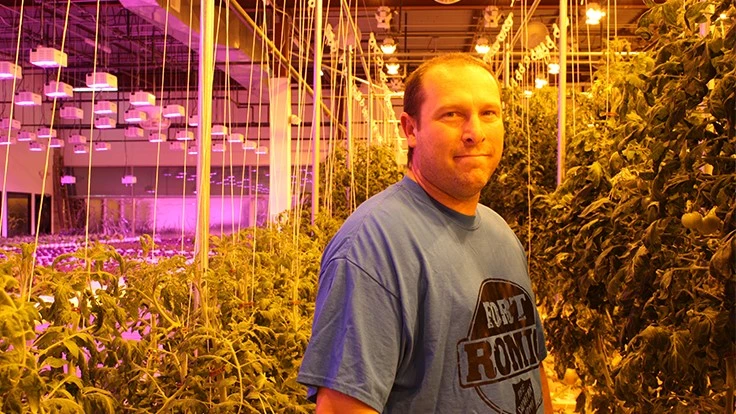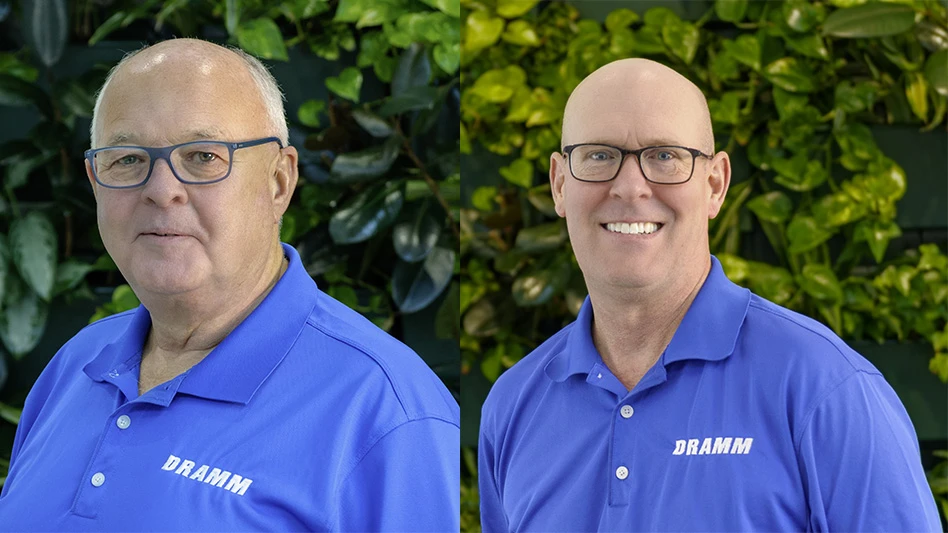
Mark Lindberg, social enterprise ministry specialist at Salvation Army
Photo: Patrick Williams
Children in and around Akron, Ohio, could help develop systems that could one day be used to grow food on Mars, upload blueprints for “food computers” and grow produce for wholesale and food pantries.
It’s all part of the studies they’re undertaking with the Salvation Army Summit County Area Services (SCAS), which opened Fresh Face Farm, an indoor growing facility, at its Akron Fort Romig location in January 2018.
The indoor farm provides the children learning opportunities in Science, Technology, Engineering and Math (STEM), culinary arts and other subjects, says Major Kevin Jackson, SCAS coordinator. Jackson says about 90 percent of these students are “at-risk,” which the Journal of General Internal Medicine defines as populations that may have low literacy rates, be economically disadvantaged, face abuse or persecution, or experience other issues. SCAS has partnered with Akron Public Schools (although participation at the farm isn’t limited to children in the district), the University of Akron, NASA and MIT. CropKing provided automated hydroponics systems, sole-source lights and other materials.
“The kids are pretty much involved in every aspect,” Jackson says. “Technology is what drives their world, so the CropKing system was perfect for us in terms of the computer and the sensors, and the automation that came with it.”
The students range in age from 18 months to 18 years, Jackson says. Younger students start out learning about aquaponics and ebb-and-flow systems — which take up about 6,000 square feet of the 18,000-square-foot Fort Romig warehouse. Once the students reach about first or second grade, they begin working in a walled-off 7,000-square-foot commercial grow room in the warehouse that The Salvation Army has outfitted with CropKing’s nutrient film technique (NFT) and Bato bucket hydroponic systems.
In the grow room, lettuce and leafy greens flourish under LEDs, while tomatoes prosper under high-pressure sodium (HPS) lights. Mark Lindberg, social enterprise ministry specialist and the operation’s only full-time employee, says the lights run from about 5 p.m. — after the students have gone home — until the early morning hours. Fresh Face Farms sells most of its produce wholesale, but it sends some to food pantries or home with students.

Basil growing in NFT systems under LED lights at Fresh Face Farm
Photo: Patrick Williams
The idea behind Fresh Face Farms began when Jackson, who has been involved with The Salvation Army his whole life, was given an assignment: to come up with a model to break intergenerational poverty. At the time, he was working throughout the western United States, and he tried growing outdoors in Montana. After weeks of 60-degree temperatures, he planted his crops, then in early June, six inches of snow fell. His wife, Linda, who is now also SCAS coordinator, suggested they try a new approach to farming.
After transferring to Akron, Jackson says he ran an online search for a possible equipment supplier and found CropKing in nearby Lodi, which he calls “sheer luck.” He applauds CropKing’s customer service and expertise, calling the business “not just a vendor.” “You know what's amazing to me?” he asks. “Every once in a while, they’ll just be driving by, and they’ll just stop by [and say] ‘Hey, how's it going? Can we take a look around?’”
Lindberg says he has had similar experiences interacting with CropKing. “Paul calls me on my cell phone,” he says. “It’s like, ‘Hey, Mark, I'm going over that way. You going to be there tomorrow?’ ‘Sure!’”
Growing up in Ashland County — a mostly rural area in Ohio — Lindberg says his parents had a garden, and he was interested in horticulture from a young age. He went on to work in facilities management, but after more than a decade with The Salvation Army, the opportunity presented itself for him to work at Fresh Face Farms. In preparation, he took CropKing’s Grower Workshop to familiarize himself with controlled environment agriculture (CEA).
Lindberg has passed some of the information he learned in the workshop onto the students at Fresh Face Farms. One lesson included how to adjust the alkalinity of water to get it to a desired pH range. On a related note, but one not taken straight from his CropKing Grower Workbook, Lindberg also had students guess the pH of orange juice and milk and then assess the pH of those liquids. “That’s one of the things I love, is this is all hands-on [education],” he says. “This is not just show and tell, but it's experiencing.”
The technology and the hands-on education come together to form a learning experience that shows promising results for inspiring children to explore new avenues of interest and excel in their lives and careers, Jackson says. Some of his former students out west have even gone on to study growing in hopes of making it a career. “When you say, ‘Salvation Army,’ it’s just not what you’re thinking,” he says. “That’s The Salvation Army of the future.”
Latest from Greenhouse Management
- Grant awarded to test western U.S. wood species for use as wood fiber potting substrate
- Pennsylvania Horticultural Society announces 2025 Gold Medal Plant winners
- GIE Media Horticulture Group wins five regional 2025 Azbee Awards of Excellence
- Terra Nova Nurseries introduces rust-free and disease-resistant heucherella
- John T. Nickel, founder of Greenleaf Nursery Co., passes away at 89
- Three tours offered at 2025 Farwest Show
- Garden Media Group announces sixth annual Women in Horticulture Week
- Star Roses and Plants announces National Knock Out Rose Day





